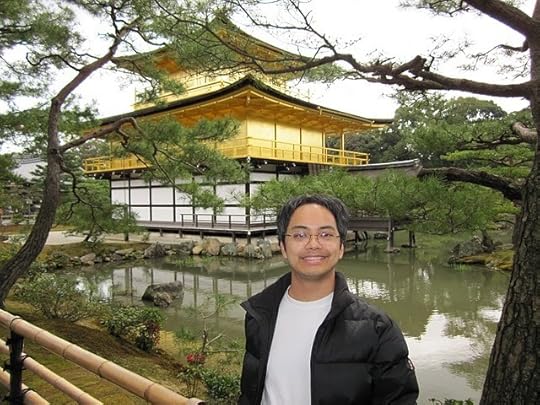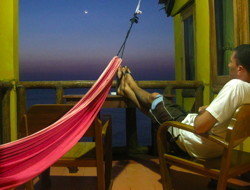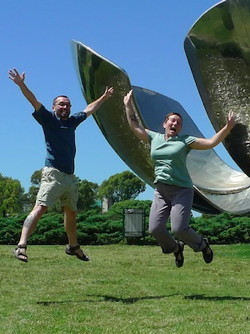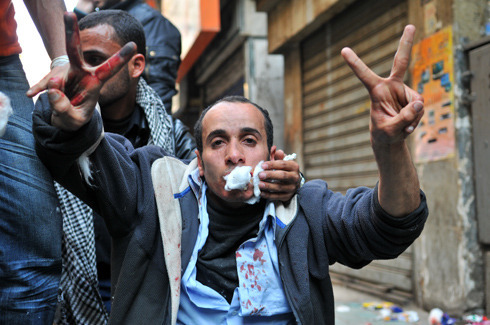Rolf Potts's Blog, page 121
August 6, 2011
Special August 2011 fares for multi-stop tickets on BootsnAll
Generally when RTW and other long-term travelers begin mapping out an itinerary for their trips, one of the first considerations is cost. Sure, it'd be great to hop from London to Paris to Rome and spend several weeks in each one, but those are incredibly expensive cities.
Start crunching the numbers and you'll see that a month or two in Europe can eat through a huge chunk of your entire RTW budget. This is even more eye-opening when you consider how long that same amount of money would last in places like Southeast Asia or South America.
Given all of that, what if you heard there were a bunch of great European destinations that would give you Euro-flair without sucking all your travel money into a big, gaping hole? In a recent BootsnAll article about budget European destinations to add to your RTW trip, the author listed 12 cities where your travel budget goes further, but that still give you the European experience you're looking for. The author notes that "there are still plenty of places on this continent to travel inexpensively, and the following 12 cities across 5 European countries won't cost more than $50US/day to travel in, so take advantage of an opportunity to see an otherwise expensive region on the cheap."
Of the multi-stop ticket deals presented below, the second and third include stops in Europe.
Here are the new special deals on multi-stop airline tickets available through BootsnAll – these deals are good through August 31, 2011:
Equator-hopper Circle Pacfic Ticket: Los Angeles – Sydney – overland – Perth – Bali (Denpasar) – Singapore – overland – Bangkok – Los Angeles, from US$1545 plus taxes
Equator to The Pole RTW Ticket: New York – Hong Kong – Singapore – overland – Kuala Lumpur – Delhi – overland – Bombay / Mumbai – Cairo – Istanbul – overland – Athens – Vienna – overland – Paris – Reykjavik – New York, from US$1799 plus taxes
Grand Caravan RTW Ticket: New York – London – Delhi – Chennai / Madras – overland – Bombay / Mumbai – Cairo – Istanbul – overland – Athens – Nairobi – overland – Johannesburg – New York, from US$1999 plus taxes
If none of these sample itineraries is what you're looking for in your round the world trip, then start planning the trip that suits you with our RTW trip planner And don't forget to sign up for BootsnAll's RTW newsletter, delivering RTW trip planning advice and resources via email every single month.
August 5, 2011
Budget traveler interview: Marcus Sortijas

Marcus Sortijas at the Golden Pavilion in Kyoto, Japan. Photo: Marcus Sortijas
Pop quiz, hotshot: what are the best travel tips you can share? I'm more comfortable writing stories about other travelers. This time, I was on the other side. Jessica Spiegel, a fellow vagablogger, put me in the hot seat in Budget Traveler Interview: Marcus Sortijas.
The piece was displayed on the website CheapTicketLinks, along with interviews of other vagabond luminaries such as Seth Kugel, who writes "The Frugal Traveler" column for The New York Times. Nice to be positioned along such esteemed company.
You can see my top picks of the most affordable travel destinations, and the biggest way to save money in Japan. As is human, I thought of some great tips after the interview was published. Here are some of them:
–Go to airport websites to look up the cheapest route to get to the city center. Usually there will be a page labeled "Transportation" or something similar that will break down all the ways to go into the city. I once did this for the Hanoi airport in Vietnam, and found out about the minibuses that local people use. They're really shared vans, rather than "minibuses." By taking a van instead of a taxi, I only spent US$3. If I had been really cheap, I could have taken a public bus for US$0.30. But I didn't want to put up with all the stops.
–Read up on scams and common crimes in guidebooks before arrival. In Beijing and Shanghai, sometimes "art students" approach tourists, claiming they want to practice their English. Later, they try to divert their marks to art galleries or overpriced tea shops. By doing some homework, you'll not only protect your wallet, but also your pride.
–In certain countries where meters aren't used, negotiate the fare before getting into a taxi. Enough said.
I emphasized in the interview that going abroad on a budget forces you to be more resourceful and adaptable. I've gone through Europe both on the backpacking circuit and on a package tour. I can unequivocally say I learned more and had a lot more fun the first way. Spending less was a pleasant bonus.
One challenging question was "What's the most embarrassing thing you do to save money (travel or not)? My answer involved "group buying" with other vagabonders at supermarkets, to take advantage of deals.
When I'm home in the United States, I take the public bus instead of buying a car. This can lead to awkwardness when friends invite me to meet up with them. If we're going to a place that's not on my usual circuit, I need a bit of prep time to figure out how to get there and go home. I would love it if Honolulu had a subway system like the MRT when I lived in Taipei, Taiwan. So sometimes I feel self-conscious about being car-less (or is it car-free?). On the other hand, when people complain about high gas prices, parking fees, insurance rates, speeding tickets, vandalization, and getting scammed by car mechanics, I see using mass transit as an advantage.
If you're interested in reading more, you can visit my personal travel blog at Marcus Goes Global. There's a contact form if you want to send me a message.
What are some of your favorite or embarrassing ways of saving money? Please share your stories in the comments.
August 4, 2011
Healthy cultures are constantly growing and evolving
"A healthy culture is like a healthy person: it is constantly changing, growing, and evolving, yet something persists through these changes, a ballast that keeps it upright and recognizable no matter how much it is buffeted by the transformative winds of trade. We can even expand the analogy a bit, and think of a culture as something akin to a society's immune system — it works best when it is exposed to as many foreign bodies as possible. Like kids raised in too-clean environments, cultures that are isolated from the world are beautiful but extremely fragile. That is why, when it comes to protecting the particular cultures of the world, "authenticity" of the sort that natives engage in for tourists is probably the last thing we should be concerned with."
Andrew Potter, Cultural immersion or imitation?, The New Zealand Herald, May 4, 2010
August 3, 2011
Vagabonding Case Study: Mike Salerno
Mike Salerno
Age: 27
Hometown: Wayne, New Jersey
Quote: "What I remember most about my travels are moments that often last a few seconds."
How long were you on the road? I've been on and off the road since January 2009.
How did you find out about Vagabonding, and how did you find it useful before and during the trip? I stumbled upon it on Amazon.com while I was in-between trips. Through my travels, I've come to certain realizations and it was nice to read a book of similar philosophy. It definitely provided inspiration to keep going.
Where all did you go? Thailand, USA, Brazil, Australia, New Zealand, Ireland, Peru, Argentina, Germany, Czech Republic, South Africa, Egypt, Jordan, Israel
What was your job or source of travel funding for this journey? I worked full time as a video editor for a marketing agency. During that time, I also produced a feature length film and had a small side business filming and editing social events. Having multiple income streams helped me allocate money for travel and also gave me something to fall back on when I got laid off.
In-between trips, I started freelancing and found that I could make the same salary as when i was working full time, in half the amount of time. I will work for a few months, travel, come home and repeat.
Did you work or volunteer on the road? Barely. I've managed a few projects while traveling. Clients ask for things at the most inopportune times it seems; a few minutes before boarding a flight, after a night of drinking at Oktoberfest, or when I am floating down the Nile.
Of all the places you visited, which was your favorite? I love cities that are encapsulated by nature, but also have a gritty side to them: Rio De Janeiro and Cape Town.
I also love the pace of life in Buenos Aires, the beauty of New Zealand, the vastness of Patagonia and the wonderful people of Ireland and Brazil.
Was there a place that was your least favorite, or most disappointing, or most challenging? Not so much. I think solo travel is a challenge in and of itself.
Did any of your pre-trip worries or concerns come true. Did you run into any problems or obstacles that you hadn't anticipated? No. Others put most of those pre-trip worries and concerns in my head to begin with. Our minds are much more dangerous than the world itself.
Which travel gear proved most useful? Lease useful? Most useful? Clothes.
The least useful? I am not the best planner, so I'd say the things I didn't pack. Gloves, Flashlight, Rain Coat, etc. You learn to become resourceful though; I've worn socks as gloves, attempted to adjust my eyes to the dark while hiking down a mountain and also very humbly hiked three hours in the pouring rain.
You really have to travel around the world at least twice- once on a whim, then once again with more of a clue.
What are the rewards of the vagabonding lifestyle? Freedom. Flexibility. Breaking the cycle of monotony in your daily life and becoming aware of the choices available to you. It's amazing how much you can experience in such a short amount of time when you aren't sitting behind a desk.
Travel is the gift that keeps on giving. You make friends from all over the world, then you come home and say you'll take a break, but the next thing you know you have an invitation to visit a friend and you are on the plane again.
What are the challenges and the sacrifices of the vagabonding lifestyle? I have one foot in the corporate world. It can be a challenge switching mindsets; I find myself asking if I even belong there anymore (or even in America for that matter).
Giving up financial stability and earning a bigger salary for the ability to travel and do what I want is the sacrifice I made these past few years. I have no fixed income and work isn't always guaranteed when I come home. I look at it this way though — over the course of a lifetime, what are a few years of uncertainty? Money can be regained, experience cannot.
What lessons did you learn on the road? Where to start? In a society that is obsessed with status where one is defined by what they do for a living, taking extended time off forces you to examine other areas of your life more closely.
I became a conscious spender as I am now more aware of where my money goes and what I spend it on.
Travel also helps you to accept the unknown. The unknown can be unsettling and restrictive, but after venturing out by myself, I found myself somewhat addicted to it.
It's exciting getting on a plane by yourself not knowing whom you will cross paths with or how things will turn out. The same can be said for my professional life; it can be thrilling not knowing who you will be working for a few months down the line, or how much money you will make in any given month. There are no ceilings.
I've learned that curiosity often transcends fear and that security is an illusion. I've found that I am more likely to swim towards a shark than away from it, which brings me to my next lesson: throughout my twenties, all the decisions that were deemed irrational by others have been the most rewarding.
How did your personal definition of 'vagabonding' develop over the course of the trip? The way my journey began was quite sporadic, and extremely unplanned, but it was uniquely my own. That's what I've come to realize; travel is very personal. We all travel for different reasons.
Travel, for me, is more of a feeling, whether I am away for two weeks or two months, whether I am abroad or in my own country. What I remember most about my travels are moments that often last a few seconds.
If there was one thing you could have told yourself before the trip, what would it be? Do not wear the same socks for four days straight while hiking the Inca Trail.
Any advice or tips for someone hoping to embark on a similar adventure? It's ok to see the world by yourself….It's better than not seeing it at all. There are places on earth that are so powerful that everything else will seem irrelevant. Aside from the world blowing you away, you will also meet amazing people along your journey.
Sometimes it may not seem like it, but there is always a choice to be made.
When and where do you think you'll take your next long term journey? I'm not sure. It'll reveal itself eventually. I am feeling good about Tanzania, Ecuador, India, Italy.
Website: lifeundefined.com
Are you a Vagabonding reader planning, in the middle of, or returning from a journey? Would you like your travel blog or website to be featured on Vagabonding Case Studies? If so, drop us a line at casestudies@vagabonding.net and tell us a little about yourself.
August 2, 2011
Celebrate Hawaii at Aloha Festivals
 In 1946, Aloha Week was created by a group of Jaycees as a cultural celebration of Hawaii's history, music and dance. Since then, it's morphed into a variety of festivals including more than 300 events across six Hawaiian islands that are attended by a million people annually.
In 1946, Aloha Week was created by a group of Jaycees as a cultural celebration of Hawaii's history, music and dance. Since then, it's morphed into a variety of festivals including more than 300 events across six Hawaiian islands that are attended by a million people annually.
Even if you're not already scheduled to be there, it's not too late to make arrangements. The festivals are usually held through September and October, with different events on each island.
Some of the highlights include:
The investiture of the Royal Court at Pu'uhonua o Hōnaunau National Historical Park, falsetto singing/storytelling and a paniolo parade on the Big Island (where events run from Aug. 27 to Sept. 25).
A hoolaulea (huge block party) and a floral parade on Oahu (where events run from Sept. 1-24).
Get a jump start on learning about Hawaii's arts and culture, whether or not you plan to be at the festivals this year. The more you know, the better you can understand the aloha spirit.
August 1, 2011
In the best travel, disconnection is a necessity
"In the best travel, disconnection is a necessity. Concentrate on where you are; do no back-home business; take no assignments; remain incommunicado; be scarce. It is a good thing that people don't know where you are or how to find you. Keep in mind the country you are in. That's the theory."
–Paul Theroux, Ghost Train to the Eastern Star (2008)
(2008)
July 29, 2011
Social networks and travel: the hard numbers

Man building his life with Facebook blocks. Photo: Urs Steiner / Flickr
Social networks have made a dramatic impact on travel. During my first backpacking trip in 2004, I relied on e-mail addresses to stay in touch with the new friends I was making. I once met a girl in Paris. Later into my trip, I was shocked to run into her at my hostel in Edinburgh. What a small world!
That kind of thing would not have happened today. We'd have added each other as friends on Facebook, she would have put a status update on her profile saying she was in Edinburgh, and I'd have messaged her before my arrival. Since people change e-mail addresses more often than their social networks, adding people is a safer way to stay in contact. Work and school e-mails are notoriously temporary.
The travel startup Tripl created an infographic that appeared in TechCrunch: More Americans are on Facebook than have a passport. A sad statistic, indeed. The infographic says 50% of Americans connect with friends and family on Facebook, while only 37% hold a passport. It continues on to say that 72% of travelers access social networks while on the road. As someone who's waited in line at hostels while guests are checking their Facebook feeds, I was surprised the number wasn't even higher.
On the flip side, the statistics say that only 7% of travelers use mobile internet on the road. I think that's due to the lack of universal standards in networks. Your mobile phone in one country often won't work in another, because your telecom carrier handicaps your phone. That and the absurdly high cost of roaming charges. From interacting with backpackers, very few use mobile phones abroad unless they're living abroad. I usually leave the phone at home and solely rely on public computers to reach my friends via the Internet.
In brighter news, it seems like about half of the users said Facebook photos inspired their trips, and also makes them visit friends who are living overseas. I will say that a trip is much richer if you have someone to meet up with over there, who can show you around.
How do you use social networks when you travel? Are they more help or hindrance? Please share your thoughts in the comments.
July 28, 2011
Good travel writing explores complexities in faraway cultures
"Just look what gets written about Afghanistan. In an age when journalism is becoming more and more etiolated, when articles are becoming shorter and shorter, usually lacking all historical context, travel writing is one of the few venues to write with some complexity about an alien culture. An Obama speech, a foreign policy paper or a counter-insurgency briefing minimizes differences, and the same phrases like 'failed states' are used to link countries which are actually very different, such as Yemen, Afghanistan or Pakistan. What kills so many briefing documents and newspaper reports, apart from their tendency to exaggerate fears and aggrandize ambitions, is their aspiration towards imperial omniscience, and their impatience with everything that is intractable or mysterious. Travel writing provides a space for all these things."
–Rory Stewart, quoted in the intro to The Best Travel Writing 2010
July 27, 2011
Vagabonding Case Study: The Talbots
The Talbots
Age: 40
Hometown: Seattle, WA – USA
Quote: "The more flexible you are the more open you can be to amazing opportunities."
How did you find out about Vagabonding, and how did you find it useful before and during the trip?
We are big fans of Rolf Potts and read his book before we even thought about taking a trip of our own. It opened up the idea of exploring the world no matter where we were and learning to appreciate the journey as much as the destination.
How long were you on the road?
We left in October 2010 and are still still traveling. Together, we might add. There were some that didn't think this was a smart move for a healthy marriage.
Where all did you go?
We've trekked through much of the Andes in South America, camped in Tierra del Fuego near the southernmost city in the world, and then cruised from there to Antarctica, where we hung out with the penguins and watched ice calve from glaciers older than man. After that, we hitched a ride as the only passengers on the same ship and cruised for 5 weeks all the way up the Atlantic Ocean to the UK, where we are spending our time exploring the excellent walking trails and hills all over the country with a rewarding pint at a pub at the end. In our future: A summer in Western Europe with a few choice housesitting gigs and then wintering in Thailand. After that, who knows?
What was your job or source of travel funding for this journey?
We set up a very strict savings plan the day after we made the decision to travel. Over the course of 2 years, we saved enough for our original goal of one year of travel and added enough to extend that journey to 4-5 years. We used our regular paychecks, bonuses, tax returns, and the sale of most of our possessions. (We took on separate side jobs to fund the trip to Antarctica.)
Did you work or volunteer on the road?
The initial plan was to simply travel for 4-5 years and only do a small bit of website development projects. However, we have now decided to make this our lifestyle so we are able to stop and "settle" for months at a time when we find some place we fall in love with. We plan to fund our travels long-term with WordPress website development and online marketing for small businesses, something that fits neatly with our previous careers and skill sets.
Of all the places you visited, which was your favorite?
We loved Antarctica and felt like it lived up to the hype and then some. Seeing blue glaciers older than anything human beings have ever built is humbling, and of course the penguins, seals, and whales are magnificent to behold. We also loved the experience of cruising up the Atlantic Ocean as the only passengers on a polar cruise ship as it was repositioning for the Arctic season. We had unlimited access to the bridge, zero light pollution to detract from the blanket of stars overhead, and the opportunity to get to know an amazing crew from the Philippines, Poland, Ukraine, Romania, and Brazil. Oh, and the food. Did we mention the food?
Was there a place that was your least favorite, or most disappointing, or most challenging?
We had a big disappointment in Colombia because of the record flooding at the time we were there as well as the holiday season. Our travel plans were severely disrupted by both of these things, and we ended up leaving without seeing more than just the border towns. On the positive side, that little bit intrigued us and we will definitely return to this beautiful country and see what we missed. As for least favorite and most challenging, we would both say Lima, Peru. We overstayed our time there, which made us resent a little bit of the city through no fault of its own. It was very hot, and we had just spent several months in the cool Andes. We felt a little bit trapped because of a previously purchased flight from there to Buenos Aires that couldn't be changed as well as a prepayment on a flat rental. It was a good lesson in not planning too far in advance.
Did any of your pre-trip worries or concerns come true? Did you run into any problems or obstacles that you hadn't anticipated?
You mean besides killing each other? One of our biggest concerns was being together 24 hours a day. We are both pretty independent and wondered how this would work out. We've been pleasantly surprised at how much it has drawn us closer and how much nicer we have become in our everyday interactions. It also means that nothing stays simmering under the surface for too long because there is too much togetherness to hide aggravations. Things get resolved very quickly. The problems that occurred that we didn't anticipate actually started on day 1 of our trip, with a political coup in our first country. The airport was closed, and we had no idea if we would even make it there. Then there was the volcano eruption, the border crossing that required a bribe to make happen, and the night we locked our keys in our room at a remote lodge high in the Andes after the electricity had gone out and the staff had gone home. These are all things that on the surface seem like they could break the trip, but they become the best stories. And they taught us that nothing is too hard to handle.
Which travel gear proved most useful? Least useful?
Is it okay to talk about our privates here? Because we absolutely love our Ex Officio underwear. It dries overnight, and you could conceivably travel the world with just one pair of these underwear. We wish everything was this easy to wash and quick to dry and stood up to repeated washings with harsh detergents, bar soap, and even sometimes shampoo. The least useful thing we brought – and quickly discarded – was the sterile IV kit we got from the travel clinic. We decided if we were ever in a really remote location and needed desperate medical attention we would likely not remember that we had a sterile IV kit in the backpack back at the hostel. Even in the most remote locations, we have been impressed with the level of medical care available. In fact, in virtually everywhere we've been we've had easier and faster access to decent medical care than we could have had back in the US.
What are the rewards of the vagabonding lifestyle?
We quit our jobs and sold everything we owned, so we are truly free to come and go as we please. It is the ultimate freedom to be able to go anywhere anytime with no considerations for stuff or schedules or commitments. Because we travel slowly, staying at least a week in every location and often weeks or months, we get to know the people and the customs. We learn exactly why many strict Catholic women in South America wear tight clothes, why the Day of the Dead is a celebration and not a mourning, who came before the Incans and what they built and what customs still remain with their descendants, and even what Scottish men wear under their kilts and why they eat haggis. It is this kind of stuff, learned at the tables and homes of local people, that make the journey far richer than checking off an itinerary of places to see.
What are the challenges and sacrifices of the vagabonding lifestyle?
Without a doubt, our biggest challenge is being away from friends and family. We had a robust social life before we left, and we miss the weekly get-togethers with friends, visits to our families, and just being "in the know" about what's going on every day with the people we love. Facebook, Twitter, and Skype are great helpers at staying in touch, but of course they don't replace the real thing.
What lessons did you learn on the road?
We learned how to give a bribe, sleep through the noise of an erupting volcano, skinny dip in the cold waters of the Antarctic, and cross the street without dying in South America. In short, we learned more about living in the moment than we ever would have in our previous lives, and this has changed us profoundly as people and as a couple.
How did your personal definition of "vagabonding" develop over the course of the trip?
The more flexible you are the more open you can be to amazing opportunities. Some of our best experiences occurred when we did this. For instance, we planned to go west after our travels in South America and visit the Pacific Islands before heading to Australia and New Zealand. Instead, we asked a crazy question to the Gap Adventures crew after our trip to Antarctica and ended up cruising for 5 weeks as the only passengers on their trip to the UK. Our entire itinerary changed, and we have zero regrets. We've had countless detours due to recommendations from fellow travelers, and almost every single one has been amazing. If we had not been open to these suggestions and stuck to an itinerary, we would have missed many things that aren't listed in the guidebooks.
If there was one thing you could have told yourself before the trip, what would it be?
Say Yes. We've had countless detours due to recommendations from fellow travelers, and almost every single one has been amazing. If we had not been open to these suggestions and stuck to an itinerary, we would have missed many experiences that aren't listed in the guidebooks as well as forge great friendships.
Any advice or tips for someone hoping to embark on a similar adventure?
Develop an attitude of embracing new experiences, stretching your boundaries, and saying yes to things that are outside your comfort zone. The good news is that you can start developing these attitudes before you even leave home. For us, vagabonding works better as a lifestyle than as just a mode of travel.
When and where do you think you'll take your next long-term journey?
We're still traveling and now consider this a lifestyle more than a trip. We're heading to Western Europe this summer and then to Thailand for the winter. After that, the loose plan we call an itinerary is blank. Unless you've got a spare room, that is. 
Twitter: warrentalbot
Website: www.marriedwithluggage.com
Are you a Vagabonding reader planning, in the middle of, or returning from a journey? Would you like your travel blog or website to be featured on Vagabonding Case Studies? If so, drop us a line at casestudies@vagabonding.net and tell us a little about yourself.
July 26, 2011
Political awareness in travel
Cairo, Egypt
Part of the totality of a place is its politics, and in long-term travel you'll likely pass through a variety of political landscapes that affect the lives of the people who call a place home. The Egyptian man above, for example, challenged the legitimacy of his President's 30-year-old rule and on February 2 of this year had a flying rock rip loose part of his lip. (Interestingly, if you were to walk about 60 seconds to either his right or left, you'd find several travel agencies offering deals on Nile cruises, desert excursions, and Sinai beach resorts; they were, however, closed this particularly day, and most travelers were packed into the Cairo airport trying to get out of the country.)
Political situations are worth paying attention to, but not only in order to gauge the stability or safety of a potential travel destination. Understanding the basics of Thai politics, the Israeli-Palestinian conflict, or the Colombian civil war will go a long way in helping you understand a country and will help you make the most of a visit there. Sometimes, of course, we go to a place knowing next to nothing but, once there, experience something that alters the course of our lives. A powerful example of this is the life of Sean Carosso, who while traveling in Africa in 2007 wrote the following in his journal:
I yelled at thieving monkeys and saw Nelson Mandela yell from stage. Cried in refugee camps and laughed during moonlight dances. Saw a baby born and parents buried. Went south to scream from the bottom of the world and made my way north to see Ugandan children become visible. Slept in mansions and huts, ate porridge and gazelle, swam with otters, fended off pickpockets and rarely showered, stopped, or stood still.
For two months, there was death and destruction,
failure and fear, adventure.wonder.motion.
But all around was a pervasive hope moving steadily
toward what could only be described as progress
Stories of change everywhere to be found. Until I walked into the chaos of Congo.
The so-called Democratic Republic of Congo, home to one of history's deadliest wars.
Strange circumstances led me to her doorstop, but there I stood ready to see
what she might show my western eyes.
The following is what they saw.
You can read the rest of his entry and learn about the organization that emerged at www.fallingwhistles.com/story. It's a powerful site.
The U.S. State Department's Background Notes is one source for a quick political overview of a country. Idealist.org is a popular site for checking out volunteer opportunities, including ones that might intersect with political issues. For example, Bustan Qaraaqa is listed there; it's a community permaculture project based just outside the West Bank town of Bethlehem.
Rolf Potts's Blog
- Rolf Potts's profile
- 323 followers






